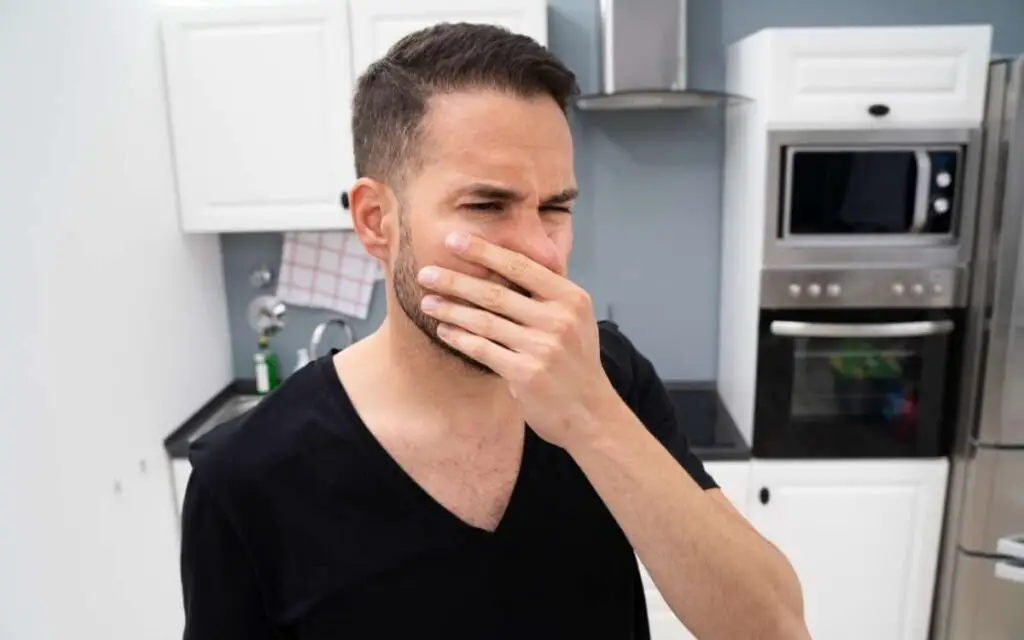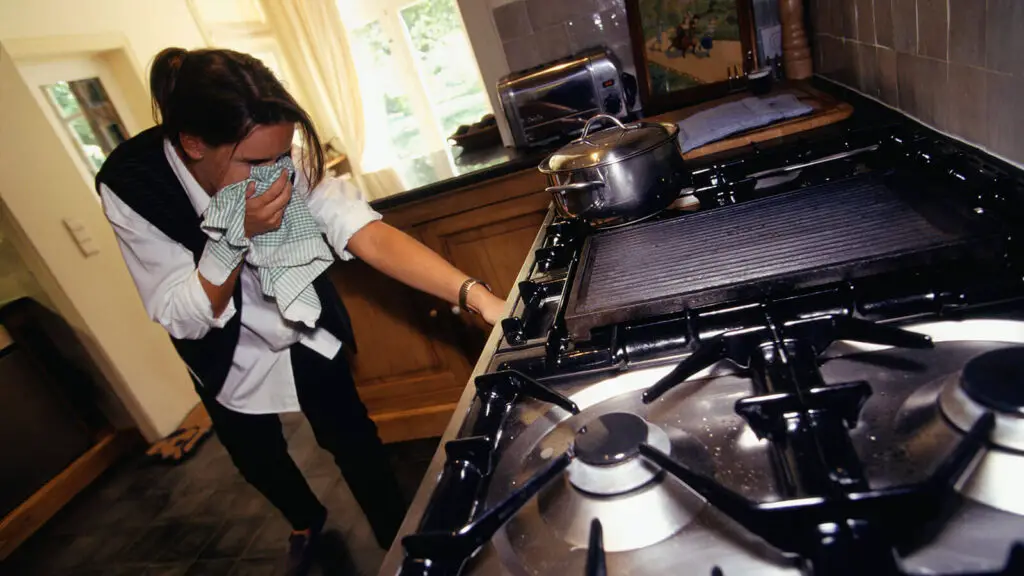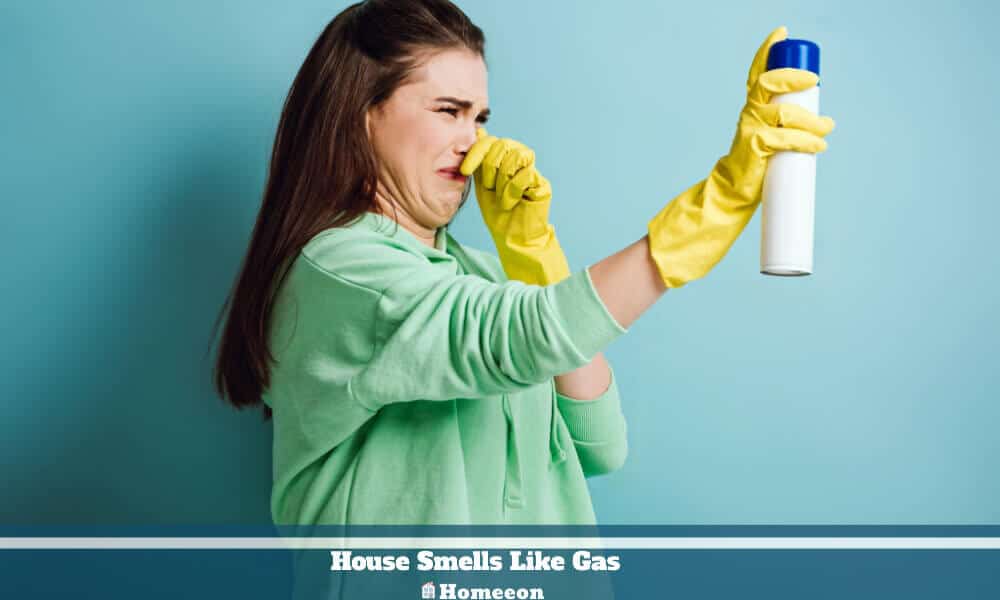Last Updated on August 5, 2023 By Emma W. Thomas
If your house smells like gas, take immediate action. Turn off the gas supply, avoid open flames or electrical switches, and ventilate the area. Leave the house and call your gas utility provider or emergency services to inspect and address the issue safely.
What To Do If You Detect A Gas Leak

If you suspect a gas leak in your home from the smell, you should not take it lightly. These tips will help you to be safe;
Don’t Turn On Switches.
When you detect any smell of gas, avoid turning on any switches. Ensure that your oven is off and don’t light things like cigarettes and matches. Ensure also that you avoid anything that could create flames.
Aerate The House
Make sure that all the windows and outer doors are open to let inadequate air. Opening the doors and windows will help the gas get out as fast as possible.
Locate The Gas Meter And Turn Off The Gas
If you are not sure where your gas meter is, try to locate it and turn off the gas. You may even call your gas supplier to help you find it. If you live in a rented property, you can find out from the owner where it is located. After locating the meter, turn the lever up to 90 degrees to the gas pipe. Doing this will help close the valve, and you will be sure that there is no more leakage.
Get Everyone Out
A gas leakage could indicate a more significant problem than you would imagine. Make sure that everybody leaves the premises or building immediately to prevent injuries in case of an accident. Inhaling the gas smell could also cause a health hazard, and it is necessary to ensure that there is no one until the smell clears.
Ask For Help
After making sure that everyone is safe outside the building, call for professional help. Do not try to figure out the problem yourself unless you are an expert. You can contact the National Gas Emergency Service to get assistance.
Inform Your Neighbors About The Problem
If you think that your neighbors might be affected by the leak, inform them. Let them also evacuate their families if the problem is likely to become worse.
Wait For The Smell To Clear Before Going Back.
If you had moved out of the premises, don’t go back until the professionals give you the go-ahead. The expert should be in a position to advise when it is safe to enter the premises if the problem has been solved.
What To Do If The Gas Smell Does Not Go Away
Natural gas is odorless in its normal state, but utility companies lace it with mercaptan (a chemical that gives it the smell of rotten eggs or sulfur). This smell helps one to detect the gas when it leaks. If, after confirming that there is no gas leakage, you still notice the rotten eggs or sulfur smell in your home, try the following;
Check Your Drainage Pipes.
Suppose there are fixtures that you rarely use in your homes, such as tubs, sinks, or showers, try to check them. The odor could result from the filtration of the sewage gas into the premises through empty plumbing traps. Sewer gas consists of methane, which has a characteristic sulfur smell. Your fixtures’ drains are all linked to the main sewer pipe in your home. Beneath each fitting, there are u-shaped drainpipes installed by plumbers as part of the ordinary drainage system.
The traps help to retain adequate water that blocks sewer gases from filtering back into the house. If an individual shower or tub remains unused for some time, the water in the trap may dry up, giving way for sewer gas to seep in. To check if a dry trap is the cause of the smell, use your nose to detect where it comes from. If the odor is coming from the rarely used fixture, the smell will be more concentrated in the fixture room. To solve the problem, you need to turn on the faucet for a short while and allow the water to drain out. The water will fill up the trap and prevent sewer gases from passing through.
Examine Your Water Heater
If you notice the rotten eggs smell only when the hot water is running, the issue could be with your water heater. While it is rare, if the water heater anode is faulty, it will produce a sulfur smell in the hot water supply. This smell can be mild initially but get worse over time. A water heater comes with a pre-installed anode rod made from Magnesium. This rod is known as a ‘sacrificial’ anode, attracts particles in water that could cause corrosion, and gets corroded instead of the hot water tank.
If the water has some chemicals, they sometimes react with the anode producing the smell of sulfur. To remedy the problem, test your sink by first running cold water, followed by hot water. If you detect the smell only with hot water, then the anode rod is the problem. You can call in a licensed plumber to replace the rod with one made from a zinc/aluminum combination.
Test The Water In Your Well
If you have a water well, then the smell could emanate from here due to hydrogen sulfide. This gas can occur in underground water due to naturally decayed vegetation. Depending on the volume of hydrogen sulfide, the smell could be mild or intense. While the smell is unpleasant, it does not make your water unsafe for use.
If you want to test for this gas, avoid using your water for some time, about six to eight hours, and allow it to build up. Place a stopper in a sink and run some water from the cold tap. If you notice some queer sulfur smell, then it could be due to hydrogen sulfide.
You can also use a water-testing kit to identify the presence of hydrogen sulfide. If the test is positive, you can treat your well with ordinary household bleach (hypochlorite), which adds chlorine and minimizes hydrogen sulfide production. Since wells that have the hydrogen sulfide gas are likely to continue smelling, you need to chlorine ‘shock’ them frequently.
You can also use carbon filters on the drinking faucets to minimize the odor. You may also have an RO (reverse osmosis) unit installed in your kitchen sink to eliminate the gas and its smell. This process works through ion exchange. You may also hire an expert well contractor to install a sand filter that helps to aerate the well.
Change Off-Gassing Drywall
Houses that were remodeled or built-in 2001 and 2009 are likely to smell off-gassing from drywall. Although it is uncommon, this kind of drywall has excess sulfur, and it could release hydrogen sulfide fumes with a foul smell. Most of the houses in South America were built with this Chinese drywall. It was a result of a shortage of better drywall due to many hurricanes.
If you suspect that this is the cause of the sulfur smell in your home, you can inspect the copper coils in your air-conditioning or fridge units. If the drywall is off-gassing, you will see some corrosion that looks like black ash on the copper coil. To get rid of the sulfur smell caused by off-gassing, you need to replace the drywall.
Since the process of replacing the drywall could be costly, you can talk to your homeowner’s insurance agent. The agent will check whether you qualify to be included in any class-action or state lawsuits that could be ongoing. In case you don’t, your homeowner’s policy is likely to cater for some or all the cost of replacing your drywall.
Check Your Sewer Line.
If you still don’t know where the smell is coming from, you can call a plumber to inspect the sewer line after checking all the above areas. If there is a broken drainpipe, sewer gases could seep out and inhabit your residence. The smell could be more intense outside in case of a broken sewer line. If the breakage is on the part of the pipe buried in the yard, the odor could also be more.
Top Causes Of Gas Leaks in the House

Here are the top causes of gas leaks in a house explained in detail:
- Poorly Maintained or Faulty Gas Appliances: Gas-powered appliances like stoves, ovens, furnaces, water heaters, and dryers can develop leaks over time due to wear and tear. If these appliances are not regularly inspected, serviced, and maintained, their connections or seals may deteriorate, leading to gas leaks.
- Damaged or Old Gas Lines and Fittings: Gas lines are typically made of metal or plastic, and they can be damaged by external factors like digging, construction work, or natural disasters. Additionally, old gas lines may degrade over time, leading to cracks, holes, or weakened connections that result in leaks.
- Incorrect Installation or DIY Repairs: Improper installation of gas appliances or DIY repairs by untrained individuals can lead to gas leaks. If gas lines, connectors, or fittings are not installed correctly, they may not be properly sealed, increasing the risk of leaks.
- Natural Disasters Damaging Gas Lines: Natural disasters like earthquakes, floods, or hurricanes can damage gas lines and fittings, causing leaks in the house. The ground movements during earthquakes or flooding can dislodge or break gas pipes, leading to hazardous leaks.
- Corrosion or Wear and Tear on Gas Pipes: Gas pipes are exposed to various environmental factors, including moisture, soil conditions, and chemicals, which can lead to corrosion and deterioration over time. Corroded or worn-out gas pipes are prone to developing leaks.
- Loose Gas Connections: Sometimes, gas connections can become loose due to vibration or movement of appliances. Loose connections can result in gas escaping from the joints and causing leaks.
- Accidental Damage: Accidents such as a collision with a gas meter or gas line can cause physical damage to the system, resulting in gas leaks.
- Defective Gas Regulators: Gas regulators are responsible for controlling the gas pressure supplied to the appliances. If the regulator malfunctions, it can lead to excessive gas flow and cause leaks.
How to check for gas leaks in your house
hecking for gas leaks in your house is crucial for ensuring the safety of your home and family. Follow these steps to perform a simple gas leak detection:
- Smell for Gas Odor: Natural gas has a distinct, pungent odor like rotten eggs. If you detect this smell anywhere in your home, it could indicate a gas leak.
- Listen for Unusual Sounds: In some cases, gas leaks might produce a hissing or whistling sound near the gas lines or appliances.
- Look for Signs of Damage: Inspect gas lines, connectors, and fittings for any signs of damage, such as cracks, corrosion, or loose connections.
- Check Gas Appliances: Examine all gas-powered appliances in your home for visual indicators of leaks, like damaged burner flames or soot around the appliance.
- Use Soapy Water: Create a soapy water solution (water mixed with a small amount of dish soap). Apply this solution to gas connections and joints using a brush or sponge.
- Observe for Bubbles: If there’s a gas leak, the soapy water will produce bubbles at the site of the leak, indicating the presence of escaping gas.
- Test the Gas Meter: Turn off all gas appliances and ensure no gas is being used. Check the gas meter; if the meter continues to move despite no gas usage, it might indicate a leak.
- Install a Gas Leak Detector: Consider installing a gas leak detector in your home. These devices can provide an audible alarm when gas levels exceed safe limits.
- Be Mindful of Symptoms: Be aware of symptoms like dizziness, headaches, nausea, or fatigue, which could be signs of gas exposure. If these symptoms occur when you’re at home and disappear when you leave, it might indicate a gas leak.
Conclusion
It would be best if you never ignored a gas smell as it could be a sign of gas leaking. You need to be cautious when dealing with this problem as it can lead to severe damage or even death if you take the wrong move. Make sure that you do not switch anything, including lights, and ventilate your house immediately. Turn off the gas supply from the source and avoid any flames.
If you do not know where the problem is coming from, ask for professional help since prevention is better than cure.
References:
https://www.horizonservices.com/about-us/blog/what-should-you-do-if-you-smell-gas-in-your-home/
https://www.confused.com/gas-electricity/guides/what-to-do-if-you-smell-gas-safety-tips-from-confused-com
Emma is a graduate of Domestic Science or Family and Consumer Sciences (Home Economics) from the University of Wisconsin. She has 7 years of experience Working with the strategic section of BestBuy and now writing full-time for Homeeon.
From Managing the Home, Interiors, Cleaning, and Exteriors to Gardening and everything about Making A Home Liveable – is her passion and this Homeeon is the result of this.
Emma loves decorating her home with the best stuff found online. She cares about quality over anything and writes reviews about them here in Homeeon. Get in touch with her over Pinterest.
Keep reading her blogs.

